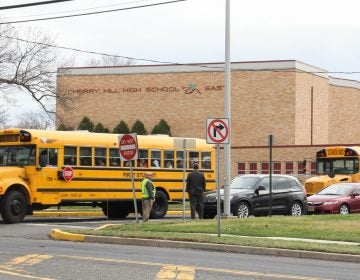New Jersey considers mandating silent alarms for schools
The silent alarm would be activated during a shooting or other school emergency. Former Gov. Chris Christie vetoed similar legislation three times over five years.

Assembly Education Committee considers the panic alarm bill. (Phil Gregory/WHYY)
New Jersey lawmakers are making another effort on legislation that would require all elementary and secondary public schools to be equipped with a panic alarm directly linked to law enforcement authorities.
The silent alarm would be activated during a shooting or other school emergency. Former Gov. Chris Christie vetoed similar legislation three times over five years.
Now that the state has a new governor, Assemblyman Ralph Caputo said he hopes the outcome will be different.
“All the violent situations that have taken place in the country, especially in Florida, Connecticut, etc., this bill becomes even more important,” said Caputo, D-Essex. “It’s not a solver of problems, but we want to cut down on the response time that police have to get to a scene in the event there is a violent situation.”
But Gerard Duffy, president of the New Jersey Electronic Security Association, said he worries that the panic alarm could be activated accidentally.
“Which could create a police response — that could be detrimental — of a task force entering a building not knowing what they have, confronting a friendly person and winding up with catastrophic consequences,” said Duffy.
The legislation would also require schools to install a red emergency light in a highly visible location near the front entrance that would go on when the panic alarm is triggered.
The system could help save students’ lives, said Lisa Yakomen, executive director of the Keep New Jersey Safe Foundation. And schools would not have to pay for the panic alarms.
“All school districts covered under this bill — regardless of the level of state aid typically received — would have the installation costs fully funded from the proceeds of bonds issued under the educational facilities construction and financing act,” she said. “These bonds would be issued even in the absence of this legislation.”
WHYY is your source for fact-based, in-depth journalism and information. As a nonprofit organization, we rely on financial support from readers like you. Please give today.




